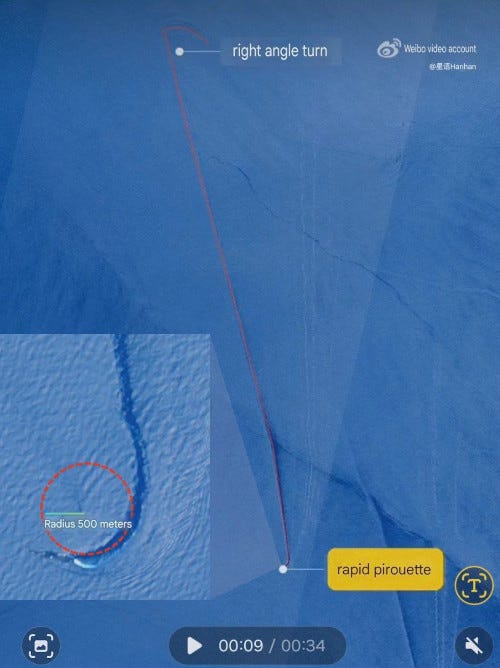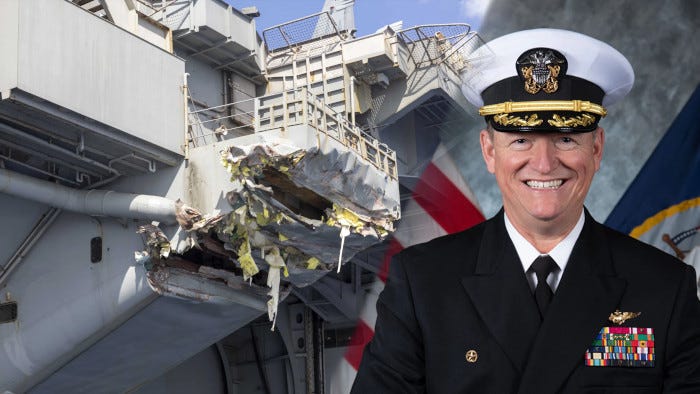– 3 May 2025 –
Janus:
At a time when major American military accidents happen every few weeks, news of an F-18 falling off an aircraft carrier hardly makes a stir. But the circumstances of this mishap demonstrate a more troublesome picture than just another case of military blunder. This is just one more example of the United State’s deepening decline as master of the seas and as global “superpower.”
Via The Military Times (“Navy Loses Fighter Jet in Red Sea After It Slides Off Carrier Deck”, 28 April 2025):
The USS Harry S. Truman aircraft carrier lost an F/A-18E Super Hornet fighter jet and a tow tractor when both fell overboard on Monday, the Navy said in a statement.
This incident marks the second Super Hornet that the Truman has lost while deployed to the Red Sea, and it is the third major mishap that has occurred aboard the aircraft carrier in the last several months.
“The F/A-18E was actively under tow in the hangar bay when the move crew lost control of the aircraft,” the statement said, adding the “sailors towing the aircraft took immediate action to move clear of the aircraft before it fell overboard.”
A U.S. official confirmed to Military.com that initial reports indicated the Truman made a hard turn to evade Houthi fire, which contributed to the fighter jet falling overboard.
CNN was the first outlet to report that detail.

In December, the USS Gettysburg, a Navy cruiser, downed another F/A-18 fighter jet from the Truman in a friendly fire incident. The jet’s two aviators were forced to eject, and one suffered minor injuries.
An individual F/A-18 fighter jet costs between $60 million and $70 million, depending on the configuration.
The pair of incidents are not the only mishaps that drew attention and headlines aboard the USS Harry S. Truman.
On Feb. 12, the Navy revealed the Truman had collided with a merchant vessel roughly half its size, the Besiktas-M, just before midnight local time while sailing near Port Said, Egypt, in the Mediterranean Sea.

"Sailors towing the aircraft took immediate action to move clear of the aircraft before it fell overboard." Haha! I shouldn't laugh, but this statement could just as well have read, "Sailors towing the aircraft off the side managed to scramble out of the aircraft's way before it fell!"
It’s hard to imagine that a bulky aircraft carrier could successfully evade incoming anti-ship missiles with evasive maneuvers, so presumably the ship was trying to avoid something slower, such as a drone. Regardless, drones and conventional missiles shouldn’t be able to get near a modern carrier, and whatever the circumstances of the sudden change of course, this can’t create enough g-force or sideways list to cause a tow tractor to pull a plane over the side of the ship. At the very least, this is just one more case of military incompetence.
It’s more significant that the tiresome, thirty-year-old scenario where we deploy a carrier or two off the coast of a small country who dared to defy Western interests, and then we launch barrages of air-strikes to break them, no longer seems to have a decisive effect. After a month and a half of such strikes on Yemen, the Houthis still apparently have the means to bypass or overwhelm the defensive measures of all of a carrier’s supporting strike group in this part of the Red Sea, enough to force that carrier to take evasive measures (and lose a jet under tow off the side in the brave scramble!) This is something quite new.
[“Bravely bold Sir Robin rode forth from Camelot….”]
The Houthis have managed to survive various attempts to quash them since they started to win the Yemeni Civil War in 2014. The Saudis acted as a Western proxy in attempting to destroy them since 2015, launching hundreds of air strikes and killing thousands before they largely gave up in 2019, signing a ceasefire with the Houthi in 2020 (because of Covid 19, they said! Haha!)
And so far, it doesn’t look like the United States is making any greater impact on the Houthi with our current air-strike campaign. Technological changes coupled with our growing military incompetence demonstrate that the geopolitical winds are shifting.
The fact is, the United States is sinking into a deep decline. Some people hope that Donald Trump’s bluster can turn the country around just like the USS Harry Truman sharply turned around to evade Houthi attacks last Monday.
Well, maybe we can avoid the next crisis, and maybe we can avoid the next one after that, but sooner or later our growing decline and incompetence will catch up to us, and somebody or something is going to hit us very hard as we try to bully them, and I don’t think we have the fundamental societal tools to recover from the fight, though we might be able to throw a serious punch or two as we’re taking in water and bleeding out fuel. (While taking in foreigners and bleeding out virility.]
Right now, as crazy as the times are, we’re living in a kind of surreal dead calm, where the wind is eerily still and every sound is a racket (and most of the racket is coming from us, screaming at enemies behind every hill or harbor, real or imagined.)
It’s hurricane season, but the storms have yet to strike America directly. It seems just a matter of time. . . .
This excerpt from an 18th century poem about the circumstances before the War of Spanish Succession, of all things, seems remarkably apt for today’s situation:
Where are the Days which to such Lustre dare
Their Shadows to prefer or to compare?
What disproportion’d and degenerate Times
(Of equal Follies and of equal Crimes)
Succeed, alike unmeriting the Lot
To be remembred, or to be forgot?
Sometimes ’tis Peace; but the Peace does not bless;
A Poisoner with the Food of Happiness.
A dull dead Calm (a dull dead Calm at best)
That keeps us bound in poor ignoble Rest,
When we the Voyage should of Glory make,
Should in the Bus’ness of the World partake,
And aid a Game where we must have a Stake.
A Sleep unquiet, whose hard breathings tell,
All is not free within, all is not well.
False as the Health that’s breeding a Disease,
And rather Florid looks, than feels at Ease.
There may be Plenty, there may be Excess,
And Elegance, and State, and Wantonness.
All does but Damocles his Feast afford,
When we look up and view th’ impending Sword.
Now the sharp Sword, more than impending
found,
Falls on the Head and does the Body wound.
Intestine Wars let loose at large to Rage
Devour the Kingdoms and deform the Age.
Prince, Nobles, States, all in one Ruin ly;
The People reign, yet ’tis not Liberty;
And their mad Architects, but half way skill’d,
Pull down old Fabricks, and no new ones build.
Strange Scenes of Government then shift to fast,
As each came only to shove off the last;
While the tir’d Realms as little understand
Whom to obey, as why they should command.
The great State Ship, on the wild Billows tost,
By ev’ry Wind is driv’n on ev’ry Coast.
If here or there at Anchor it abides,
‘Tis but a while, and rolling as it rides.
Here, thoughtless Laughter grown th’ affected
Guise,
Wit the dull Folly scorns of being wise.
Pleasures o’erflow, our Manners to defile,
And foreign Modes effeminate the Isle.
The Tricks of Cybeleian Gauls we play,
And toss and dance, as giddy and as gay,
Take the Fool’s Coat, and toss the Man away.
And there so heartlessly to War we go,
The Foe is wish’d the Friend, the Friend the Foe.
— excerpt from “Upon the Successes of the War, Jan. 1706 to 1707,” John Glanvill, 1725







